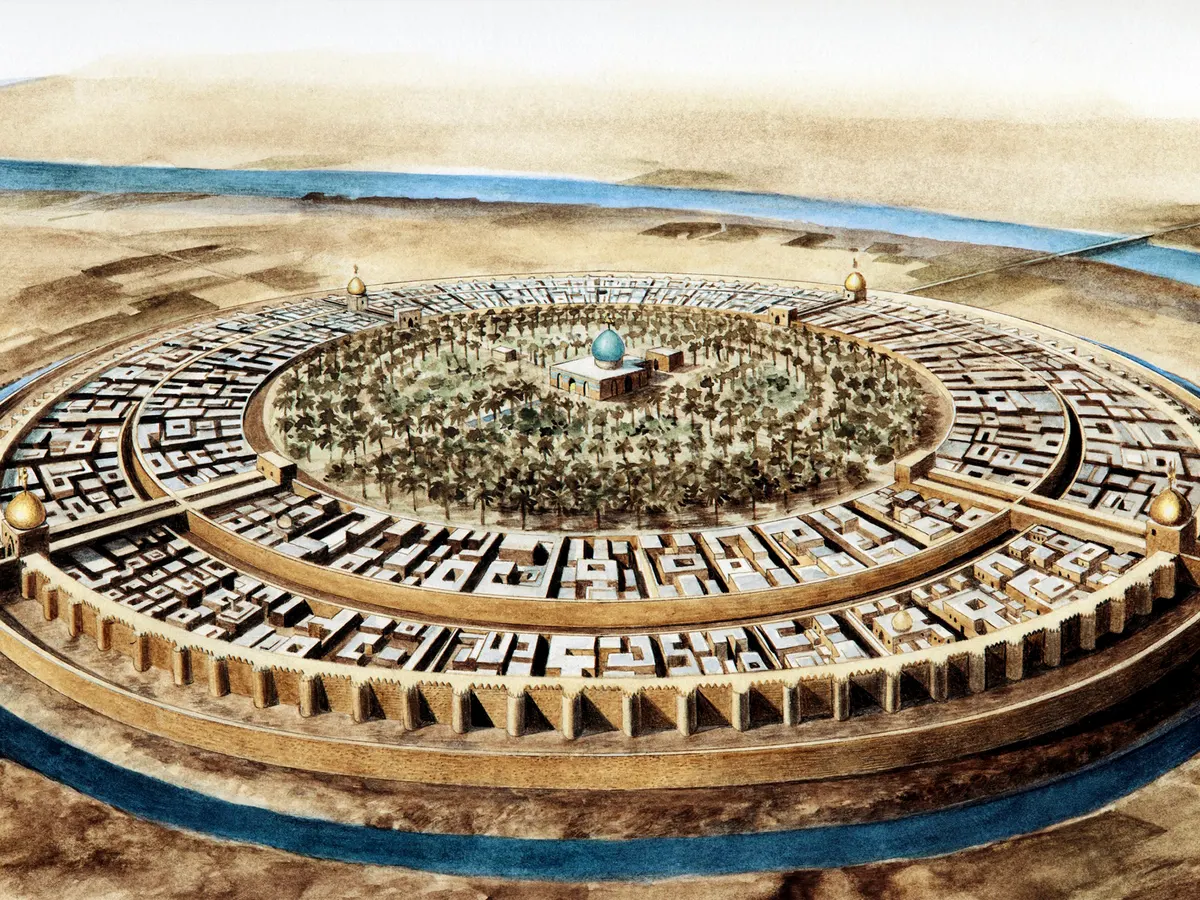
Introduction:
In the annals of urban design, the founding of Baghdad 1,250 years ago by the Abbasid caliph al-Mansur represents a glorious milestone. More than just a city, it was a beacon of civilization, quickly evolving into the cultural lodestar of the world. Contrary to common belief, Baghdad is not ancient but rather a testament to al-Mansur's vision and strategic planning. This blog explores the remarkable attributes and accomplishments of al-Mansur, the visionary architect behind the 'Round City' of Madinat al-Salam, which would later become the illustrious imperial Baghdad.
The Birth of Baghdad:
In AD 762, al-Mansur, known as "The Victorious," laid the foundation for Baghdad as the new seat of his Islamic empire. Unlike its ancient counterparts—Nineveh, Ur, and Babylon—Baghdad emerged as an upstart, a testament to the caliph's forward-thinking approach to urban development.
Meticulous Planning and Inspired Design:
Al-Mansur's meticulous planning for the 'Round City' is well-documented, showcasing his commitment to both form and function. Influenced by Euclidean geometry, he meticulously traced the city's circular design on the ground, symbolizing unity and inclusivity. Cotton balls soaked in naphtha were set ablaze to mark the double outer walls, fortifying the city against external threats.
The Grand Construction Project:
The sheer scale of the construction project was unprecedented in the Islamic world. A workforce of thousands, including architects, engineers, legal experts, and laborers, was recruited from across the Abbasid empire. The brick walls, rising four miles in circumference along the Tigris, were constructed with meticulous precision, each course consisting of varying brick quantities bonded with reeds.
Innovative Urban Design:
The circular design of Baghdad was a groundbreaking innovation. Al-Mansur's 'Round City' featured four equidistant gates leading to straight roads that converged at the city center. The strategic positioning of gates facilitated trade and access to key regions. The Kufa and Basra Gates opened onto the Sarat canal, enhancing Baghdad's significance as a trade hub.
Cultural and Religious Center:
The central enclosure of Baghdad, approximately 6,500 feet in diameter, housed the Great Mosque and the caliph's Golden Gate Palace. Al-Mansur's palace, a sprawling 360,000 sq ft structure, boasted a remarkable 130ft-high green dome and served as a testament to the union between temporal and spiritual authority.
Enduring Legacy:
By 766, Mansur's Round City was complete, earning acclaim for its height, circularity, and superior defenses. Unfortunately, in the early 1870s, the city walls were dismantled in the name of modernization, erasing the physical traces of al-Mansur's grand vision.
Conclusion:
Abu Ja'far Abd Allah ibn Muhammad al-Mansur's legacy as the visionary architect of Baghdad goes beyond bricks and mortar. His 'Round City' was a testament to strategic planning, innovative design, and a commitment to creating not just a capital but a cultural and intellectual hub that would endure for centuries. In the words of the ninth-century essayist al-Jahiz, Baghdad under al-Mansur was unmatched in height, circularity, and merits—a city poured into a mold and cast, leaving an indelible mark on the tapestry of Islamic history.
Go backAl-Mansur: Architect of Baghdad's Magnificent Legacy
Published on December 17, 2023
Share this post
Excerpt
In the annals of urban design, the founding of Baghdad 1,250 years ago by the Abbasid caliph al-Mansur represents a glorious milestone. More than just a city, it was a beacon of civilization, quickly evolving into the cultural lodestar of the world. Contrary to common belief, Baghdad is not ancient but rather a testament to al-Mansur's vision and strategic planning. This blog explores the remarkable attributes and accomplishments of al-Mansur, the visionary architect behind the 'Round City' of Madinat al-Salam, which would later become the illustrious imperial Baghdad.
About the author
At The Islam Shop, we don't just sell products; we craft experiences that resonate with the essence of Islamic excellence. Our mission transcends mere transactions; we aspire to be the unparalleled leaders in the online Islamic marketplace.
Our commitment is unwavering — to offer you not just a selection, but an expansive array of choices that embody the rich tapestry of Islamic culture. We don't just provide value; we redefine it, ensuring that every purchase is not just a transaction but a journey into the world of quality and significance.
We are more than a seller; we are curators of passion, dedicated to sharing our expertise with you. Our team doesn't just offer advice; we provide insights driven by a genuine passion for Islamic products. We believe that each product tells a story, and it is our mission to make sure that story resonates with you.
The Islam Shop isn't merely a platform; it's an invitation to be intrigued, excited, and inspired. We aim to ignite your curiosity and continually motivate you to embrace and celebrate Islamic products. Our commitment goes beyond selling; it's about fostering a connection, sparking an interest, and creating an enduring bond with every customer.
Step into a world where every click is a step towards enriching your life with Islamic elegance. Join us as we passionately lead the way, shaping the future of online Islamic commerce.
Welcome to The Islam Shop — where choice, value, and passion converge to redefine your Islamic shopping experience.
Elevate your expectations; embrace the extraordinary.
The Islam Shop Team








